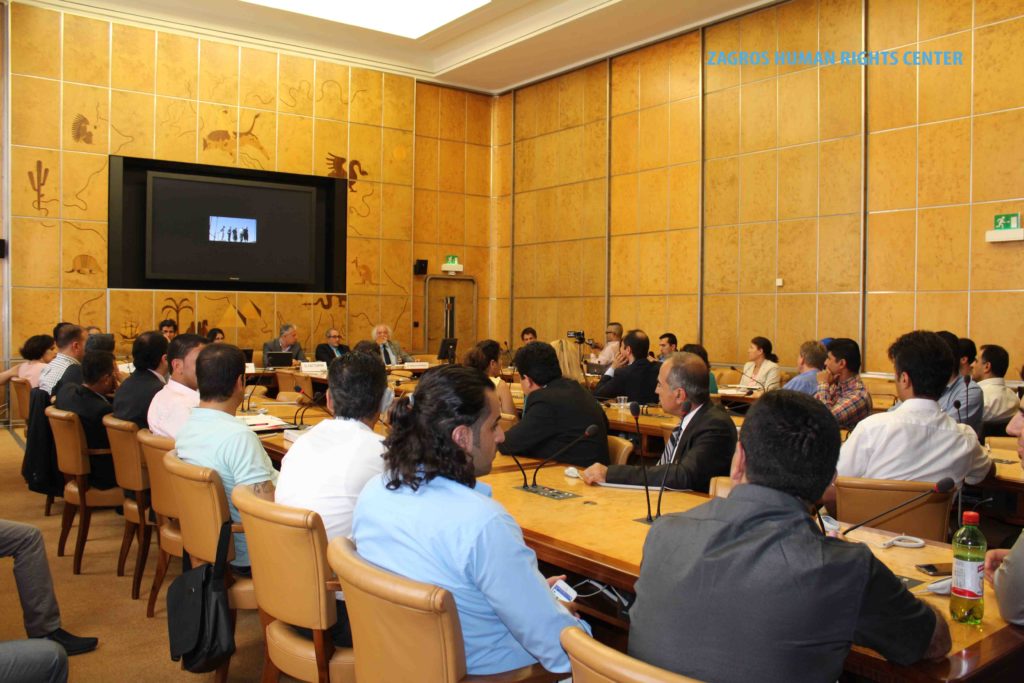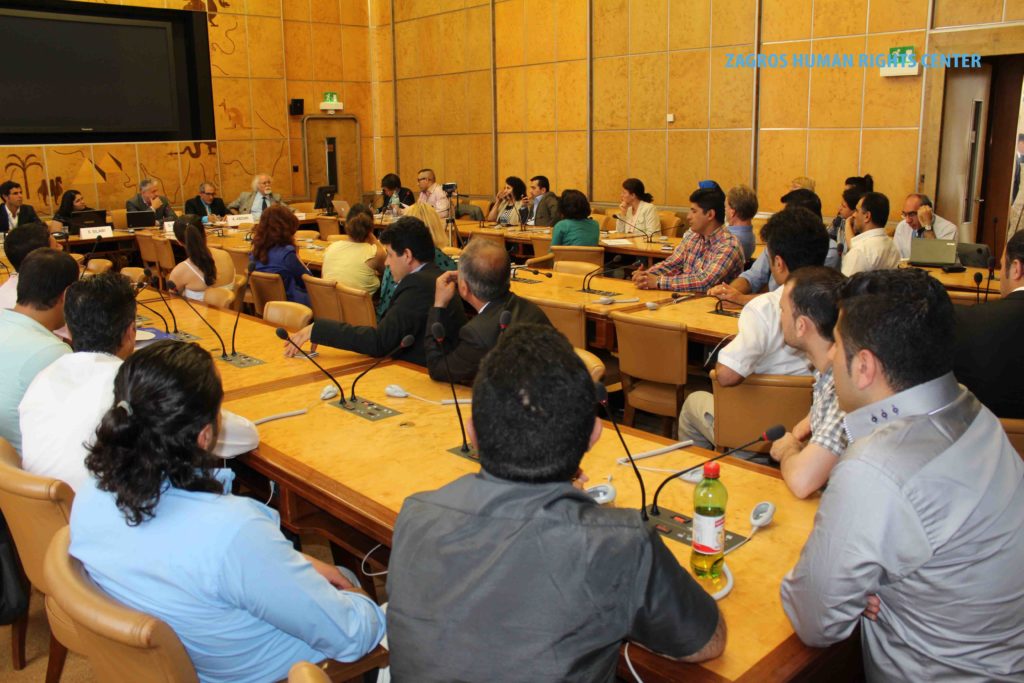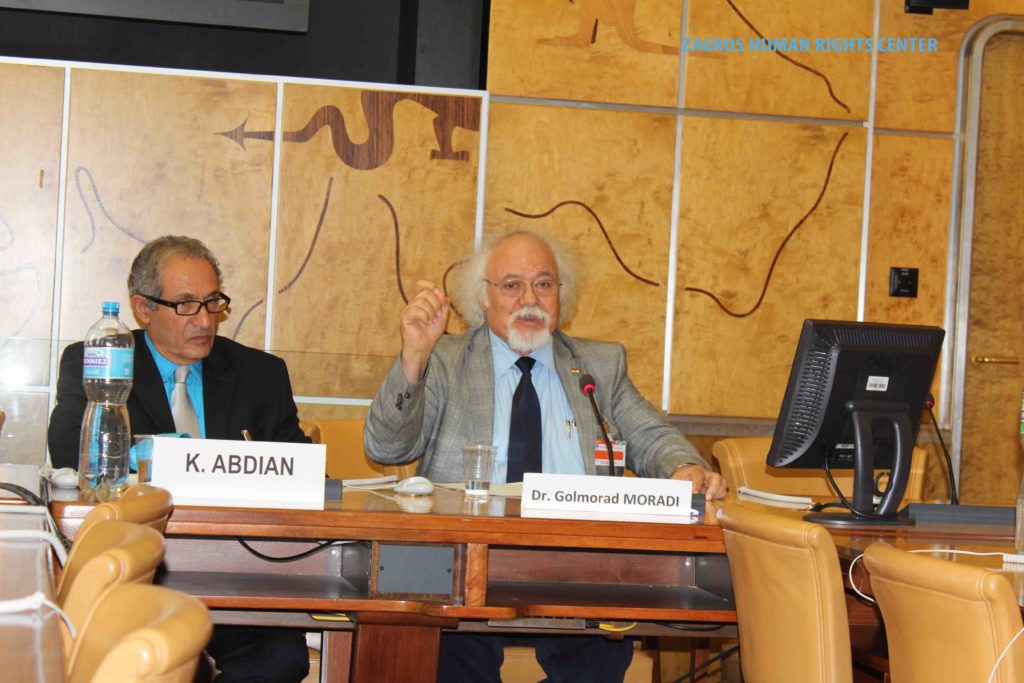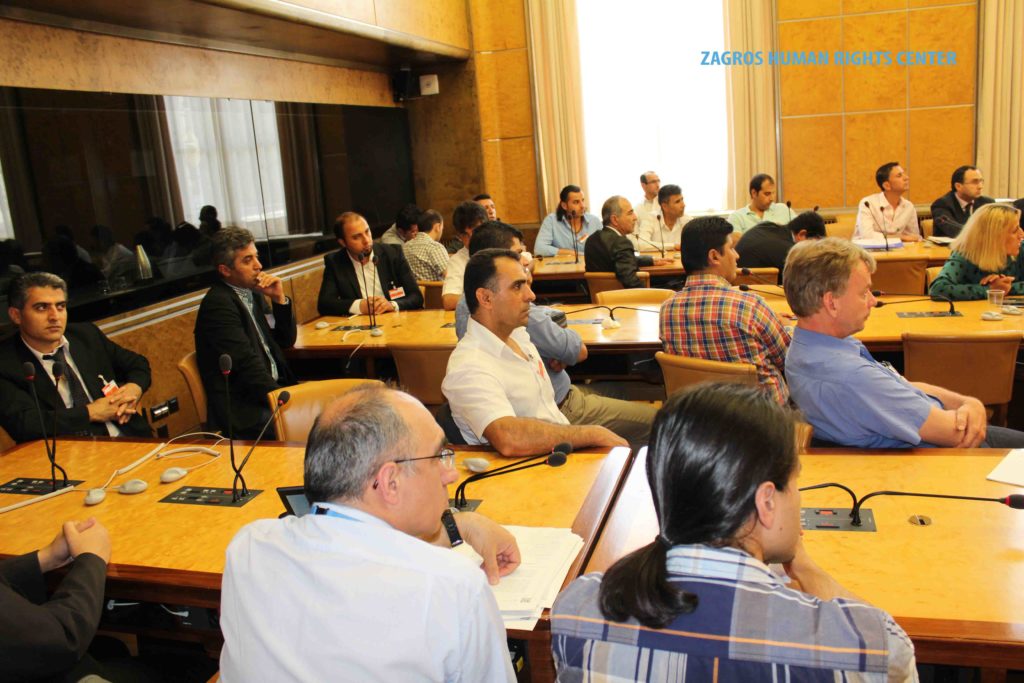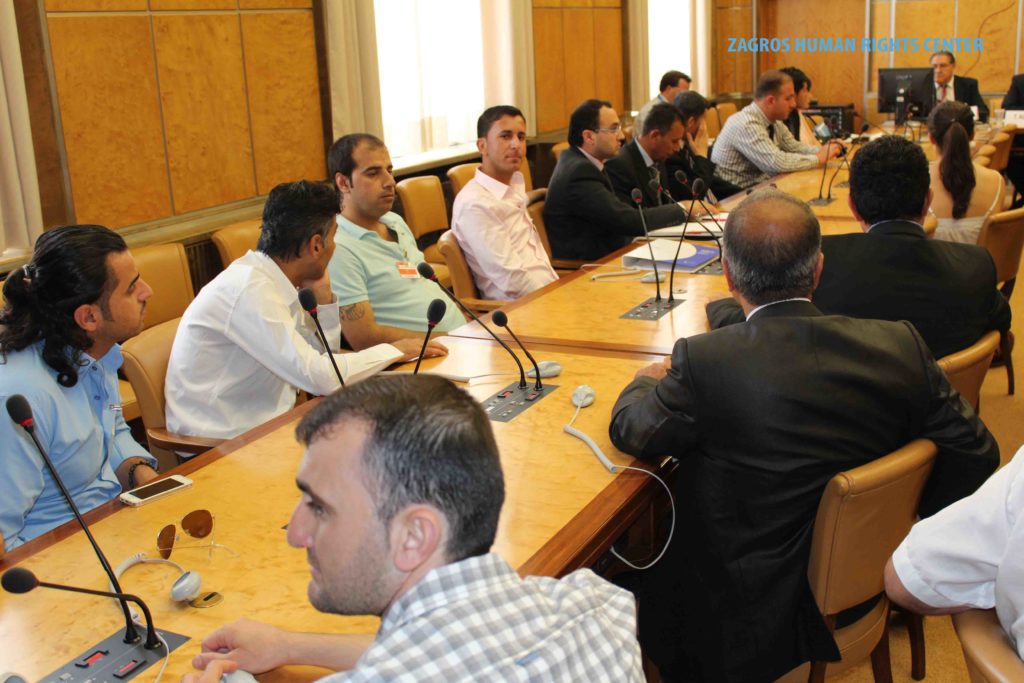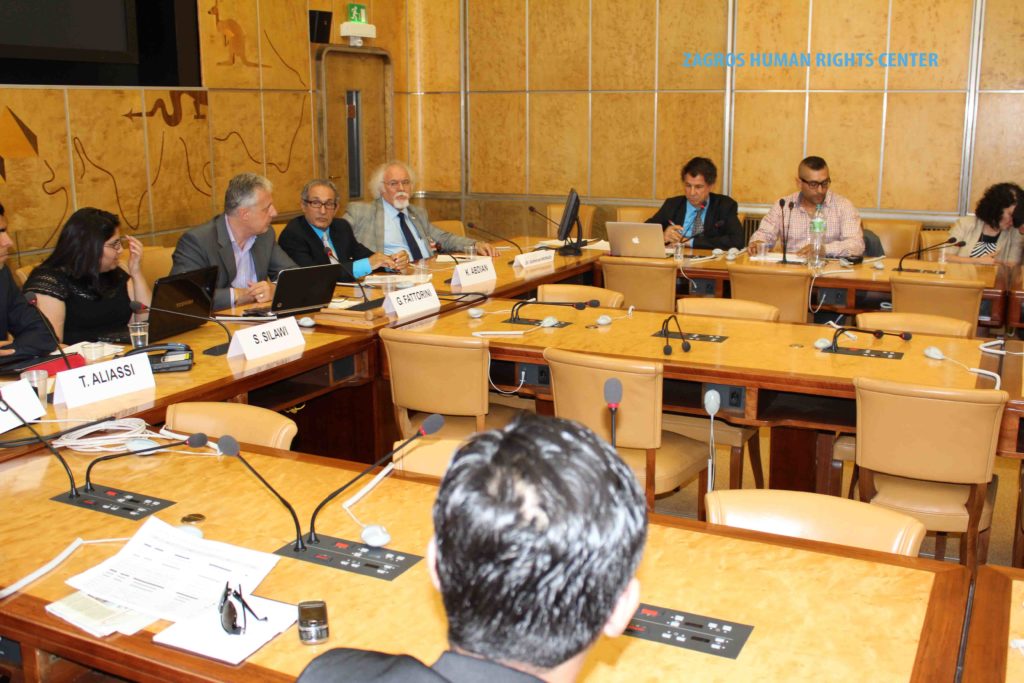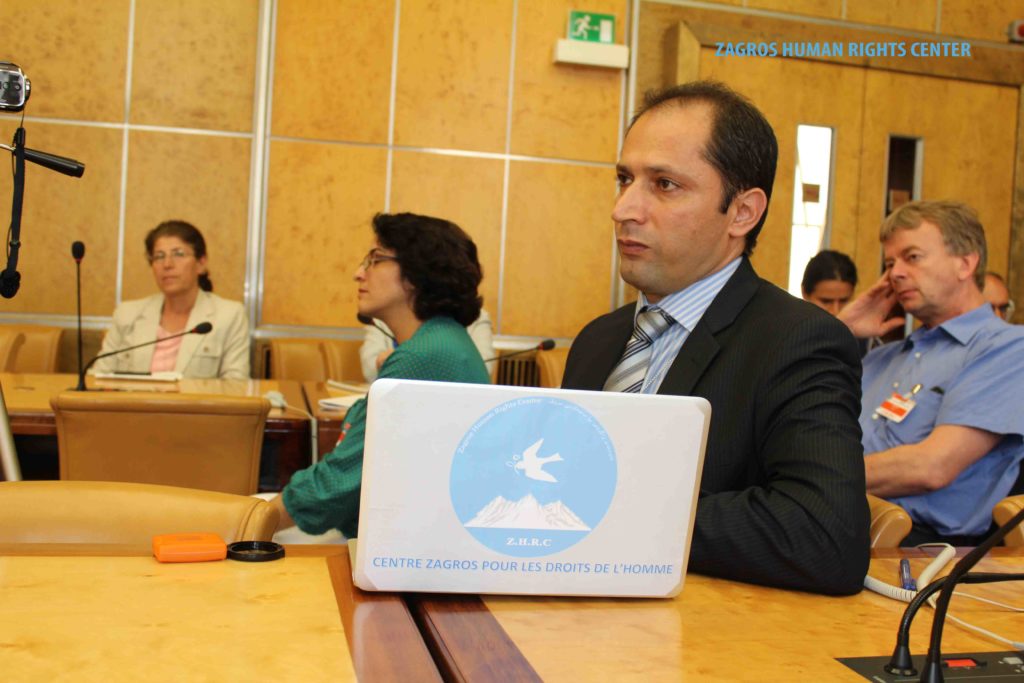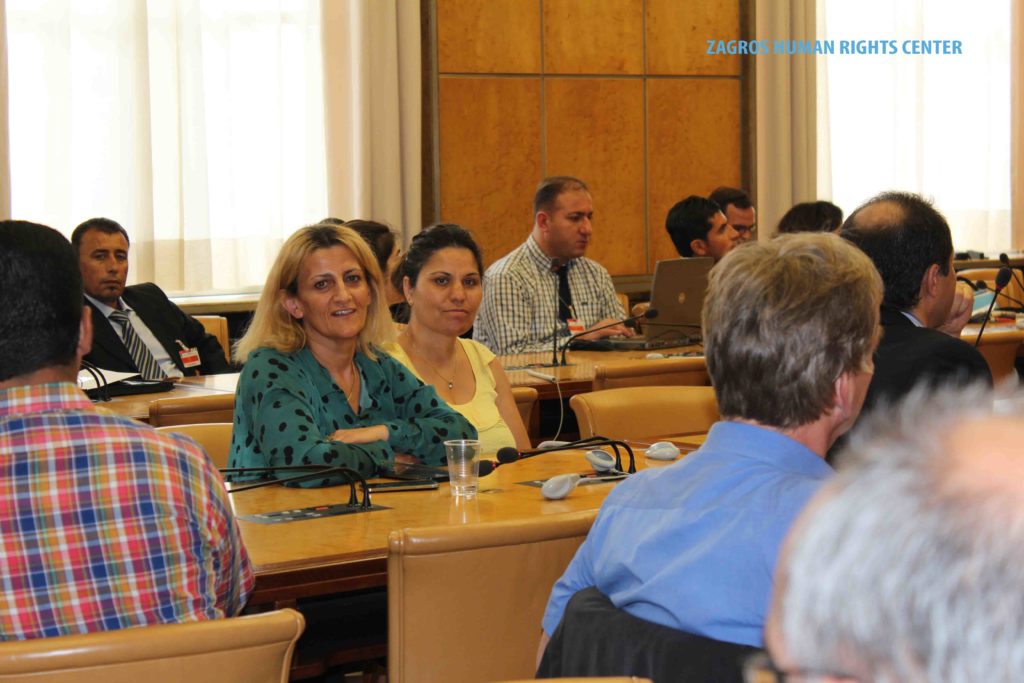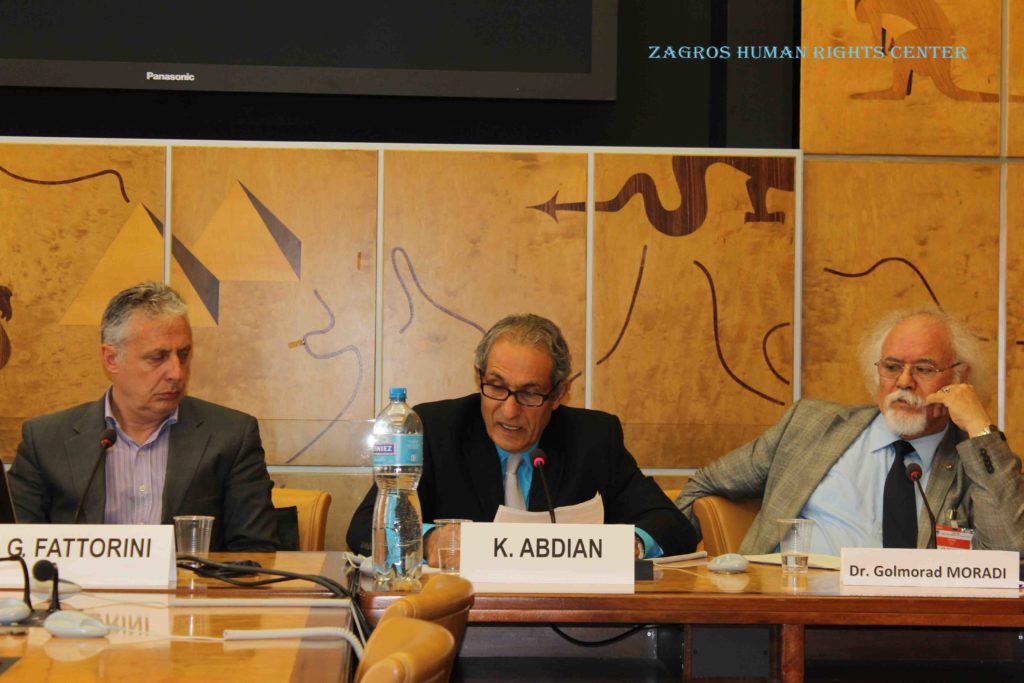On the 13 of June, on the occasion of the 26th session of the Human Rights Council meeting in the Palais des Nations in Geneva, it has been organized a Side-Event on Situation of national, ethnics and religious Minorities, one year after the Selection of Mr. Hassan Rohani (as a President of Iran) in the permanent sites of the United Nation Organization in Geneva.
This Side-event has been organized by ZHRC – Zagros Human Rights Center and MRAP Organization (The Movement againsit of Racism and for the Friendship among the Peoples), for discussion the situation of human rights of national and religious minorities, such as Azari, Blotch, Turkmen, Kurds, Arabs and also the religious minorities such sunni muslim, Derawish Gonabadi, Yarsans, Bahais and other religious minorities in Iran.
First speaker, Mr. Taimour Aliassi discussed the minority rights policy of President Rouhani, who is entering his 2nd year as president. Mr Rohani made commitments to improve the rights of minorities, both during his electoral campaign and after taking he office. However, the situation did not improve and in it only got worse. For instance, during his election campaign, Mr. Rouhani made ten written commitments to promote the rights of persons belonging to ethnic minorities in Iran, but none of these commitments were carried out as promised.
The second speaker was Dr. Kamal Sido, from the Society of Threatened Peoples based in Germany, presented a detailled reports about the multiples discriminations against ethnic and religious minorities in Iran.
The following speaker, Dr. Karim Abdian, the president of the Ahwaz Human Rights Organization, and the representative of, Congress of Nationalities for a Federal Iran, pointed out that Mr. Rouhani neglected the implementation of article 15 of the constitution, which allows non-Persian language and specifically Turkish, Arabic, Kurdish and Baloch to be taught in schools in non-Persian regions and provinces. He also promised that non-Persian cultures and literature were to be respected and tolerated, along with the dominant Persian culture. After one year of his presidency, nothing improved for minorities. Instead, we are witnessing a 20% increase in execution rates compared to Ahmadinejad’s presidency. He mentionned also a penal code which was passed by the Majlis in May 2013, in that article (279), under the title “rebels” allows an increase in executions for charges of “Mohareb” and “Mofsed fi Alaraz”, translated as “Corruptions on Earth”. Under this new penal code, prisoners are executed with no right to appeal. More than 20 Ahwazi-Arab civil right activists have been executed in the past year under this new penal code.
Dr. Abdian added that the Islamic Republic of Iran is now following the same policies of the Pahlavi regime, by promoting the Persian nation as the sole identity. Mr. Abdian condemned the government cleansing policies, which aim at settling Persians in Arab populated areas, leading to the displacement of 1.2 million indigenous Arabs to central Persian provinces. He demanded that Arabs should have their most fundamental human rights respected, without being labeled as ‘separatist’, ‘secessionist’, ‘Wahabis’, or a ‘threat to territorial integrity’. Mr. Abdian demanded the West, the P5+1, to not ignore the plight and the human rights of minorities in its negotiations with Iran. Mr. Abdian also mentioned that however, the Arab region in Iran is very rich, but the Arab people of Al-Ahwaz are very poor and their areas has remained underdevelopped.
Next speaker, Ms. Sheyma Silawi, the representative of UNPO, discussed the human rights violations against minorities in Iran, including Arabs, Baloch, Azeri, Turkmen, and religious minorities such as Sunnis, Baha’is, and Mandaeans. They face discrimination and violations of their rights in environmental, economical and socio-political fields.
Ms. Silawi declared that UNPO condemns the recent excessive execution against minorities, and demands that the International Community and the United Nations, amid the debates on the nuclear issue, do not lose sight of the urgent need for improving minority and overall human rights in Iran.
Dr. Golmorad Moradi, president of the Zagros Human Rights Centre, condemned the Islamic Republic of Iran for pursuing the discrimination aigaint minorities, hign numbers of executions among ethnic minorities activists; especially among the Kurds, the Arabs, and Baloch, who suffer from executions the most, and Azeris, Turkmens, Lors, Persians, as well as religious minorities as Sunnis, Yarsani’s, Baha’i, and Darawishs. Even followers of minority religions which are recognized in the Iranian constitution-Christianity, Judaism, and Zoroastrianism – face discrimination when it comes to job opportunities and education. Mr. Moradi holds the Islamic Republic of Iran responsible for the miserable situation and poverty of many.
Dr. Moradi demanded that Iran to the promotion and protection of the right to study in one’s mother tongue. Furthermore, he asked all executions be stopped immediately.
So, he pointed out to the question of widespread presence of landmines, who caused more than 800 hundreds sacrifices among Kolbars. (Littrally Kolbar, means people carring goods from other side of border to Iranian side).
The conference ended with questions and responses of audiances.
ZAGROS HUMAN RIGHTS CENTER
13 June 2014
